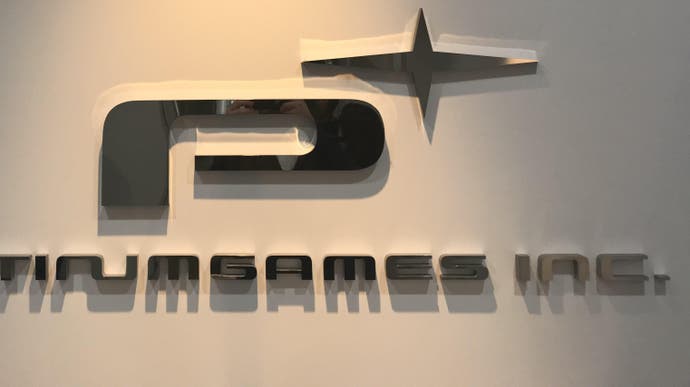Platinum never loses its lustre
A postcard from inside one of the world's greatest developers.
There's a story I've heard passed around a few times over the years about PlatinumGames. It's about how, so industrious is this Osaka-based studio, it never really stops working; how its employees are put onto shift-work, one working through the day while the other toils away through the night, ensuring a never-ending 24-hour production cycle. It's a myth, sadly - though that's fortunate for the studio's 190-strong workforce, you'd figure - but like all myths there's surely a kernel of truth in there somewhere. How else to explain how the studio has produced some 14 games in just over a decade? How else to explain the exquisite craft that's almost always on show?
Maybe you'll find the answer in PlatinumGames' headquarters, spread over two floors of the Umeda Sky Building. It's not the tallest building in Osaka, but it's certainly the most ostentatious; built just before the economic bubble burst in late 80s Japan, it looks like a space invader squatting over the Osaka skyline, its two 40-story towers joined by an outrageous atrium that hangs high up in the air.
Inside, the building is a study of quiet industry. Take the lift up to PlatinumGames' floor, and you'll be surrounded by neatly dressed workers heading for their days behind desks at pharmaceutical companies, multinational automakers and consulates. Follow the one person not in a suit and tie - the guy in his mid-forties, perhaps, sporting an oversized hoodie and oversized skater shorts, his hair falling down to his shoulders - and you'll know which floor to get off at.
Step into the lobby and the first thing you see is a stark white wall with that sparkling 'P' placed on it in chrome, beneath it an entryphone that looks ominous in its isolation. Look beneath that and you'll notice the carpet is made of squares that commemorate PlatinumGames' past titles; there's Bayonetta and its sequel, The Wonderful 101, and Transformers Devastation. Even The Legend of Korra, perhaps the only real dud in the studio's back catalogue, gets given its dues.
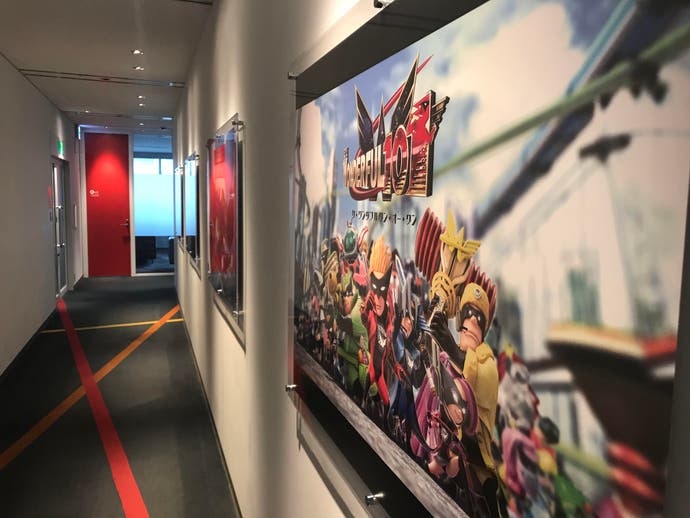
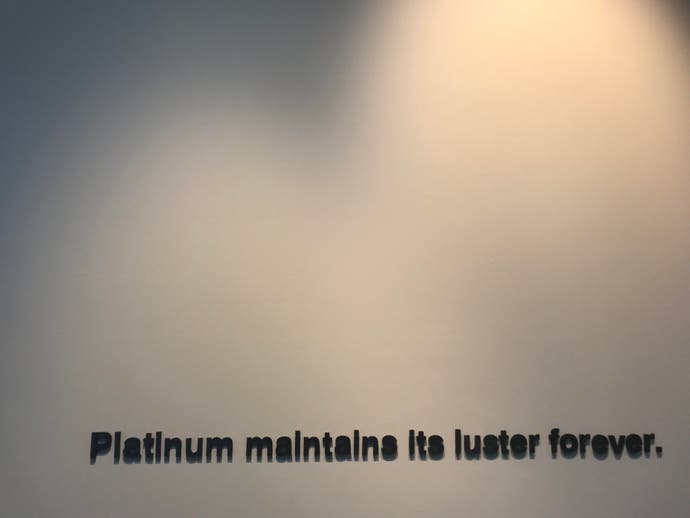
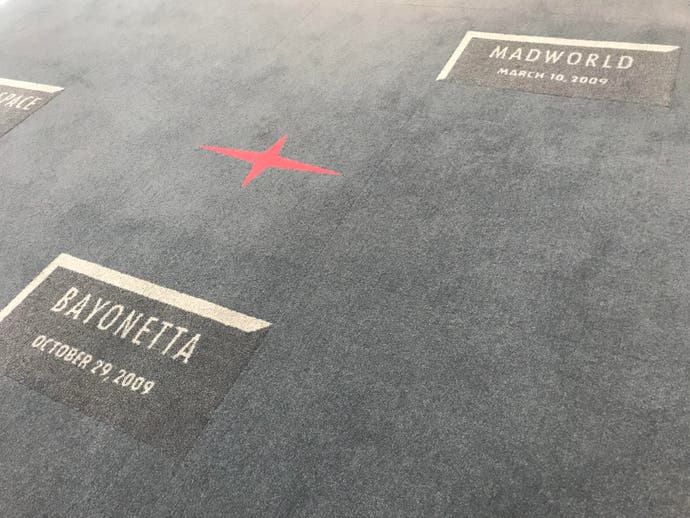
There's a cabinet containing the entirety of PlatinumGames' output - bar its Turtles game, perhaps a reflection of the fact it was pulled from digital stores only eight months after its release - and many of the studio's accolades. Turn around and you'll see another white wall, stark in its nakedness bar a slogan, tastefully spelt out in chrome characters: 'Platinum maintains its lustre forever'.
It wasn't too long ago there were concerns that maybe the shine was coming off of the studio. At the outset of 2017, Scalebound - PlatinumGames' most high-profile project, and the work of its most high-profile employee, Hideki Kamiya - was cancelled, four years of work lost as the tangle of indecision and shifting targets that envelop most productions got the better of it. There was concern, too, that Scalebound's cancellation could have been a killing blow for a studio that has always maintained its independence (PlatinumGames remains under the ownership of its management and employees).
But this is PlatinumGames, and there's always another project just around the corner. Thankfully, that next project was Nier: Automata, developed in partnership with Square Enix and one that would go on to become one of 2017's most critically acclaimed games. The timing - Nier: Automata came out just over a month after Scalebound was officially scrapped - couldn't have been any sweeter. "Nier's success has to this point given Platinum a new fanbase, a growing staff, a brilliant success story, an increase in qualified job applicants, and a great benefit," Kamiya would later say on Twitter. "To say that [Nier: Automota director] Yoko-san saved Platinum would not be an exaggeration."
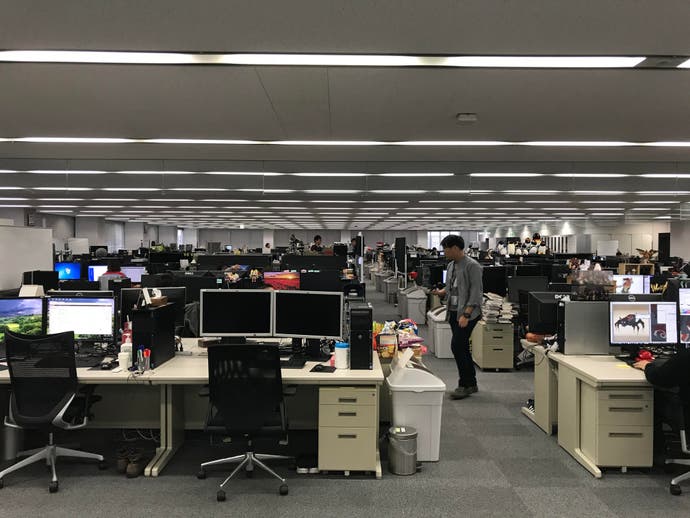
It's easy to jump to the conclusion that PlatinumGames' next project, a partnership with DeNA called World of Demons that will mark the studio's first release on mobile platforms, came as part of an attempt to save the company after the cancellation of Scalebound, but that's not the case. The project began back in 2015, and isn't some quick, throwaway exercise; with a team of 30 behind it, culled from teams who'd previously worked on the likes of Bayonetta 2 and Star Fox Zero, it's very much PlatinumGames' next big thing, and that shows in the final product. World of Demons has that Platinum feel, and it has it in spades.
Later, when I get a chance to talk to Masaki Yamanaka, PlatinumGames' head of game design, I wanted to find out exactly what it is that's behind that Platinum feel - how, no matter whether you're playing on mobile, at home on a PlayStation 4 or on Nintendo's Switch, you always feel their indelible mark on a game.
"We consider action games to be our speciality at PlatinumGames - it's what we're known for," he says. "I'm not sure if the way we think about it is that different from how other companies approach action - mostly it's the response, and how it feels. We want our players to feel that they're doing something really cool, to give them the sense that they're getting stronger, learning new moves. That's the most important thing.
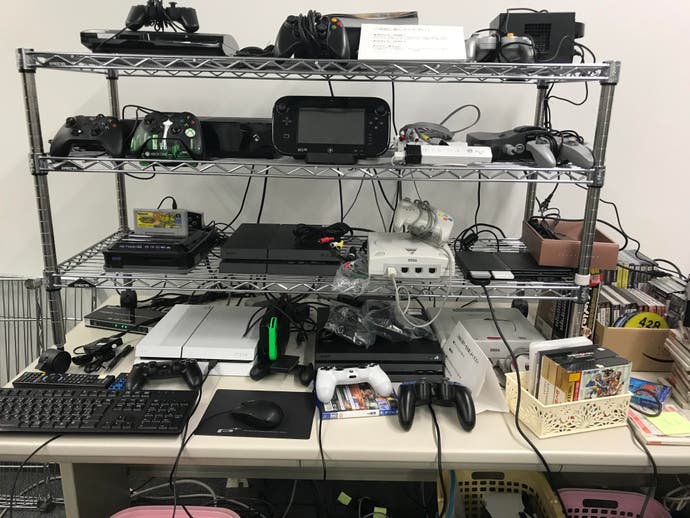
"We want them to think three things - this feels great, those enemies are so powerful but I'm really cool."
There are other action games, but there's also a clear Platinum difference - an edge that makes them stand out amongst the competition, and indeed amongst all other games. Where, exactly, does that difference lie?
"When I think about what makes Platinum's games different, for us we think about a high risk, high return system. It's about a system of extremes. For example, giving particular feedback to the players when they manage to avoid an attack right before it was going to hit them, so there's benefits to putting themselves into dangerous situations. The harder the game gets, the more fulfilling it is."
This is a developer that loves a challenge, then, and the hardships it's endured in recent years have no doubt made those successes all the sweeter. Back on the shopfloor, the studio is as quiet and industrious as any other company it shares the Umeda Sky Building with - like any games developer, there's no real Charlie and the Chocolate Factory magic behind the scenes, just an open-plan office with low, strip-lit grey ceilings, where even superstars such as Atsushi Inaba and Hideki Kamiya take their place amongst the throng. (Inaba's desk sits perpendicular to the rest, the only concession to his seniority it would seem as he fixes the workforce with his trademark dissatisfied stare while Kamiya, in the only hint of rock and roll behaviour, seems to be running fashionably late to the office).
These are ordinary people, even if their output is more often than not extraordinary. The secret to it all? It's nothing more complicated than hard, studied work. "Games change, with generations and how things develop," says Yamanaka. "But to maintain our lustre, the things we should focus on, and we will focus on, is achieving a consistent level of quality through all those changes. That will keep our fans happy."
This article is based on a press trip to PlatinumGames' studios in Osaka. DeNA covered travel and accommodation costs.
